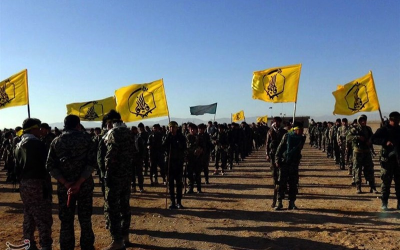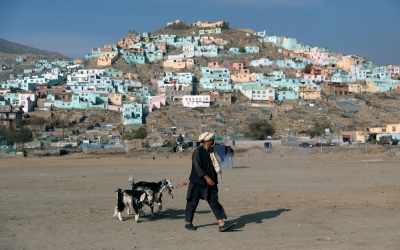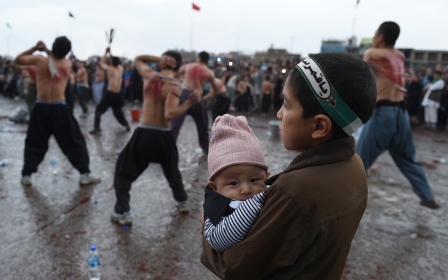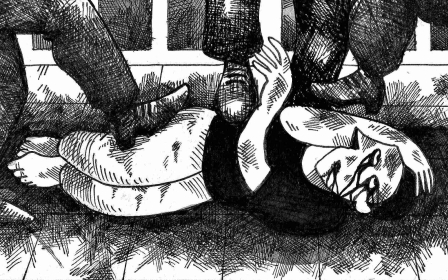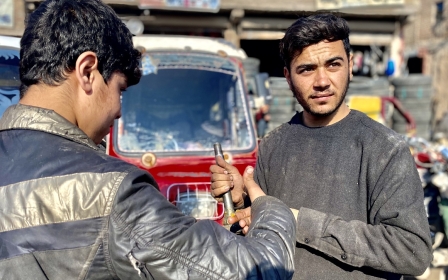In offering an Afghan militia to Kabul, Iran's Zarif causes outrage
Iran's Foreign Minister Mohammad Javad Zarif has come under fire in Afghanistan after offering Kabul the use of a militia of Afghan refugees - which Iran established and deployed to Syria - to fight terrorism.
In an interview with the Afghanistan's largest private news broadcaster, TOLONews, Zarif praised the Fatemiyoun Brigade as "the best" fighters against the Islamic State militant group and said that Kabul could "rebrand" it to fight terrorism within Afghanistan.
‘We don't need our people to be used by a foreign government and then sent back to us like they're some kind of a gift, so Iran can justify its actions'
- Rahaina Azad, Afghan MP
The comment, which had been used in trailers ahead of its Monday broadcast, incited online outrage over the weekend. When the interview aired in full, Zarif's comments did little to quell the anger.
Raihana Azad, an MP for the southern province of Daikondi, called Zarif's offer an "unfortunate" and "shameful" act by a high-level official of a foreign government.
Like many other Afghans familiar with Iran's recruitment and coercion practices that led to the creation of Fatemiyoun, Azad was particularly incensed by Zarif's insistence that Iran did not send foreign fighters to Syria, adding that "our [Afghan] brothers would go [to Syria] voluntarily".
New MEE newsletter: Jerusalem Dispatch
Sign up to get the latest insights and analysis on Israel-Palestine, alongside Turkey Unpacked and other MEE newsletters
"How irresponsible of Mr Zarif to refer to these poor people, who would go fight in a foreign war out of a lack of opportunity and in an attempt to feed their families, as volunteers," she said.
Iran, which has been home to at least three million documented and undocumented Afghan refugees since the Soviet occupation in the 1980s, has repeatedly come under criticism by human rights groups for its mistreatment and abuse of Afghans.
Azad said the Afghan government should take serious action against the practice of Afghans being conscripted into foreign wars by other countries.
The MP said Zarif's entire demeanour throughout the interview was an "insult" to the Afghan people, who had been "fighting to defend themselves and the world against terrorists" for decades now.
Azad saw Zarif's offer as nothing more than a way for Tehran to absolve itself of the sin of conscripting foreign nationals to fight its own battles in another nation.
"We don't need our people to be used by a foreign government and then sent back to us like they're some kind of a gift, so Iran can justify its actions," Azad said.
Testing public opinion
Though Azad's statements were indicative of the anger and frustration felt among Afghans, analysts and journalists who have been covering Iran saw less cause for alarm.
Soraya Lennie, an Australian-Iranian journalist who has covered Iran for years, said the interview was likely a way for Zarif, and Tehran in general, to test the Afghan waters, now that the United States was intent on withdrawing its remaining forces and peace talks with the Taliban continued at a snail's pace in Qatar.
Lennie said Zarif was likely "making Iran's position known publicly and testing to see where it goes in the sphere of Afghan public opinion".
She also said it was highly likely that this was not the first time the suggestion has been made to the Afghan government, but that it was important for Tehran to see how the Afghan people would react to the possibility.
Tehran may simply be looking for some good PR and a rebranding of a force that had been the source of great controversy in Afghanistan and abroad, the analyst said.
"It would shift the Fatemiyoun from being an Iranian puppet to perhaps a bit more loyal to their own homeland and people," Lennie told Middle East Eye.
During the interview, Zarif tried to draw such a connection when he said "some [of the Fatemiyoun] raised the Afghan flag in their outposts and hung photographs of the Afghan president" while fighting on Syrian soil.
Keeping tabs
'It would shift the Fatemiyoun from being an Iranian puppet to perhaps a bit more loyal to their own homeland and people'
- Soraya Lennie, journalist
Additionally, Lennie said the redeploying of the Fatemiyoun to Afghanistan would be a major logistical help to Tehran, whch cannot admit that they were Iranian proxies in Syria, but which also needs to be aware of their whereabouts and actions going forward.
"If they are back in Afghanistan at the direction of the Afghan government, then Iran will know exactly what they are doing," she said.
Ariane Tabatabai, author of No Conquest, No Defeat: Iran’s National Security Policy, said Zarif "went a bit further than what is generally acknowledged by Iranian officials" when he admitted that Tehran was arming the Fatemiyoun and providing benefits to their families living in Iran.
However, Tabatabai said, Zarif was "massively downplaying the Iranian relationship with the Fatemiyoun," including the role of Iranian officials and security forces in recruiting, equipping, training and deploying Afghans to Syria.
Tabatabai, who has conducted extensive research on the Fatemiyoun, echoed comments by Azad that a considerable number of those fighters were not sent to Syria voluntarily.
"Many are not in a position to give consent to fight in a bloody war, as they are underage," said Tabatabai.
In the past, rights groups have claimed that Afghan boys as young as 14 had been conscripted by Iran.
Azad said if Iran wanted to be genuine about its support of the Afghan state, it didn't need to try and rehabilitate the image of the Fatemiyoun. Instead, they could simply make a sincere commitment to fight terrorism in Afghanistan and the region as a whole.
For years, Iran, like Pakistan, has faced repeated accusations of aiding and abetting Taliban members, something Azad said must end.
Azad also said she had found evidence of Iran assisting the Taliban in the provinces of Uruzgan, which she formerly represented in parliament, and Daikondi, where she is from. This in addition to previous reports of Tehran's involvement with the Taliban in the provinces of Herat, Farah, Helmand and Ghazni.
"If Iran really wanted to be an honest, neighbourly nation, they should stop funding and training the Taliban," she said.
"If they did this, there would be no need for them to send back the force that they created by taking advantage of our people's desperation."
Middle East Eye delivers independent and unrivalled coverage and analysis of the Middle East, North Africa and beyond. To learn more about republishing this content and the associated fees, please fill out this form. More about MEE can be found here.


